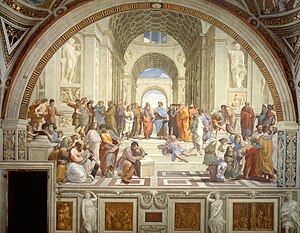History of science
The history of science is the study of the historical development of science and scientific knowledge. The English word scientist is relatively recent – first coined by William Whewell in the 19th century. Previously, people investigating nature called themselves "natural philosophers".

Science is a body of knowledge about the natural world, produced by scientists who observe, explain, and predict real world phenomena. Historiography of science, in contrast, often draws on the historical methods.
Facts about the natural world have been described since classical antiquity. Ancient Greece is perhaps most famous for its contributions to astronomy and mathematics. Aristarchus of Samos came up with the idea of the Sun at the centre of what we now call the Solar system many centuries before Galileo.Others, like Thales and Aristotle were interested in the natural world.
Scientific methods have been used since the Middle Ages (Roger Bacon), but the dawn of modern science is often traced back to the early modern period and in particular to the scientific revolution that took place in 16th- and 17th-century Europe. Important figures in the development of modern science include Isaac Newton, Johannes Kepler, Robert Boyle, Charles Darwin, Wilhelm Roux and Albert Einstein.
Scientific methods are so fundamental to modern science that some consider earlier inquiries into nature to be pre-scientific.[2] Traditionally, historians of science have defined science sufficiently broadly to include those inquiries.[3]
The natural sciences are these:
There are various applied sciences which depend on one of more of the natural sciences. Medicine is an example.